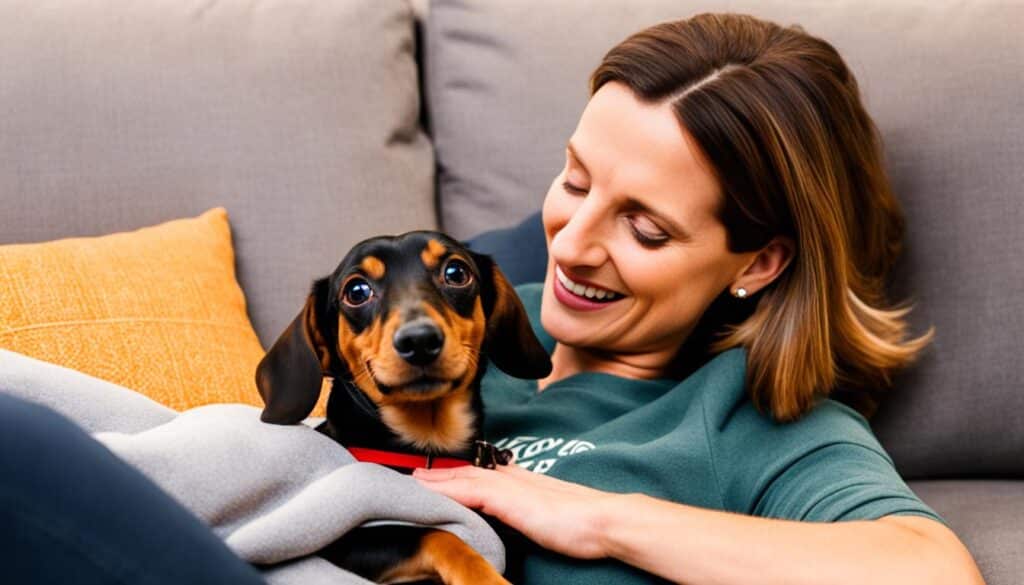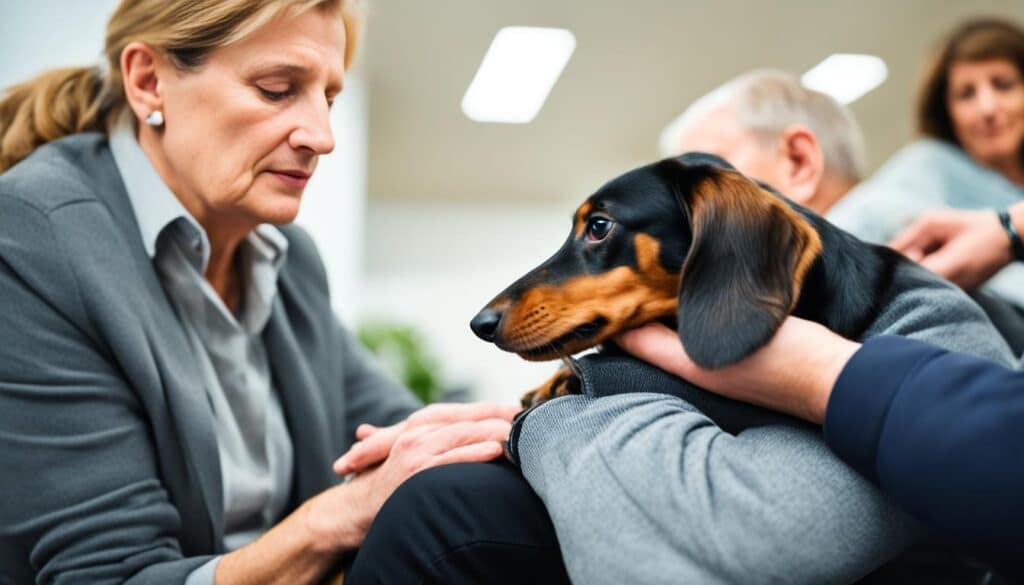Have you ever experienced the deep loyalty of a canine companion? If so, you understand the unique bond that forms between a person and their dog. It’s a connection that touches the heart and brings immense joy to our lives. As a proud Dachshund owner myself, I have witnessed firsthand the unwavering devotion these little dogs can possess.
But there’s something intriguing about Dachshunds that sets them apart from other breeds. They have a reputation for favoring one person in the family, clinging to that special individual as if their world revolves around them. It’s a fascinating aspect of their behavior that begs the question: do Dachshunds truly favor one person? And if so, what factors contribute to their unwavering loyalty?
Key Takeaways:
- Dachshunds are known for favoring one person in the family.
- Their loyalty is deeply rooted and can bring immense joy to their favored individual.
- Understanding the factors behind their selective affection can help strengthen the bond.
- Early socialization and positive experiences play a crucial role in a Dachshund’s loyalty.
- Promoting healthy bonds in multi-person households requires equal attention and shared responsibilities.
Do dachshunds attach to one person ?
Dachshunds are known for their loving and loyal nature, often forming strong attachments to one particular person.
This section will delve into the reasons behind Dachshunds’ tendency to favor one person. There are several factors that can influence their attachment and selective affection.
- Time spent together: Dachshunds often develop a strong bond with the person they spend the most time with. If one particular individual is responsible for their care, feeding, and exercise, the Dachshund may naturally gravitate towards that person.
- Personality compatibility: Dachshunds, like all dogs, have their own unique personalities. They may be more drawn to individuals who possess qualities or behaviors that resonate with them. This compatibility can lead to a stronger bond and preference for one person.
- Early social interaction: The role of early socialization cannot be underestimated. Dachshunds that have positive experiences with a variety of people during their critical early development stages are more likely to form secure attachments and exhibit selective affection towards a favored person.
Signs of selective affection can manifest in various ways, such as demonstrating excitement or displaying special behaviors when in the presence of their favored person. It is important to understand that Dachshunds can still form bonds with other family members or individuals, but there may be a primary attachment to one person.
Understanding the factors that contribute to Dachshunds’ attachment and selective affection is key to nurturing a healthy and loving bond with these wonderful dogs. In the next section, we will take a closer look at the broader aspects of Dachshund behavior and attachment.
Understanding Dachshund Behavior and Attachment
Dachshunds are known for their unique behavior and strong attachment to their favored person. To gain a comprehensive understanding of these characteristics, it is important to explore their breed traits and personality. This section will delve into the factors that influence Dachshund attachment, signs of their selective affection, and the role of early social interaction in shaping dachshund loyalty to one person.
Factors Influencing Dachshund Attachment
Dachshunds’ attachment to a specific person can be influenced by various factors. Early socialization plays a crucial role in their ability to bond with different individuals. Positive interactions with various people and pets help develop their social skills, leading to a more balanced attachment. Additionally, consistent positive reinforcement and physical affection from their favored person contribute to a stronger bond and sense of dachshund loyalty to one person.
Signs of a Dachshund’s Selective Affection
Dachshunds often display certain behaviors that indicate their selective affection towards a particular person. These signs include flattened ears, enthusiastic greetings, and body language that reflects a strong emotional connection. When a Dachshund is with their favored person, they may show excitement, wag their tail vigorously, and seek close physical proximity, showcasing their dachshund bond with one person.
The Role of Early Social Interaction in Canine Loyalty
Early social interaction plays a pivotal role in shaping a Dachshund’s loyalty and attachment. The crucial socialization period between birth and 6 months of age lays the foundation for their relationship with humans and other animals. Positive experiences during this phase help them develop trust, confidence, and a sense of security. Continued socialization throughout their lives further strengthens their ability to form healthy bonds in multi-person households.

How to Promote Healthy Bonds in Multi-Person Households
Building strong bonds with your Dachshund in a multi-person household is essential for a harmonious and loving environment. Here are some practical tips and strategies to help you promote healthy relationships between your Dachshund and every member of your family.
1. Training Techniques: Consistency and positive reinforcement are key when it comes to training your Dachshund. Use rewards, such as treats or praise, to reinforce good behavior. Set clear expectations and establish a routine that all family members can follow. This will help create a sense of stability and establish boundaries for your Dachshund.
2. Equal Attention: Ensure that each family member spends quality time with the Dachshund. This could include taking turns feeding, grooming, and playing with the dog. This equal distribution of attention helps the Dachshund feel loved and valued by everyone in the household.
3. Shared Responsibilities: Caring for a Dachshund is a team effort. Assign different responsibilities to each family member, such as walking the dog, cleaning up after them, or taking them to veterinary appointments. This shared responsibility not only helps in bonding with the Dachshund but also teaches valuable life skills and promotes a sense of unity among family members.
4. Family Activities: Engage in activities that involve the entire family and the Dachshund. Going on walks together, playing games, or even taking obedience training classes as a family can strengthen the bond between your Dachshund and each family member. These shared experiences create positive associations between the dog and every person in the household.
Conclusion
Living harmoniously with a loyal Dachshund can be a truly rewarding experience. Although they may favor one person, their unwavering loyalty creates a deep bond of love and companionship. However, it’s important to recognize that there are challenges that come with this type of attachment.
Encouraging independence in Dachshunds is crucial to maintaining a balanced relationship. By providing them with socialization opportunities from an early age, you can help them develop positive relationships with other family members and pets. This will contribute to a more harmonious household and reduce any potential feelings of exclusion.
To promote independence, it’s essential to distribute responsibilities and attention equally among all members of the household. By taking turns in caring for your Dachshund and engaging in shared activities, you can help them feel included and loved by everyone. Additionally, training techniques that reinforce positive behavior and encourage autonomy can go a long way in nurturing their dachshund bond with one person.
In conclusion, embracing the unique loyalty of a Dachshund can enhance your life in countless ways. By understanding their breed characteristics, promoting independence, and nurturing their attachments, you can create a balanced environment that allows both you and your loyal companion to thrive.
